The training was conducted as part of a three-day seminar for Polish, German, and Israeli teachers entitled „Teaching about the Holocaust and Auschwitz. The fate of women and girls”, which took place in Cracow, Poland, on January 25-28, 2023. The event was held with simultaneous translation into Polish, German and Hebrew.
The event’s main organizers were the Polish Teachers’ Union (ZNP), the Galicia Jewish Museum, and the Friedrich Ebert Foundation (FES). ZNP was responsible for the recruitment process of Polish teachers and cooperated with the German and Israeli teachers’ unions, which were responsible for recruiting participants from their side. Teachers from Poland and Germany mainly taught history and social studies in middle and high schools, while teachers from Israel taught core subjects in kindergartens and elementary schools. The Galicia Jewish Museum provided the space for the event and was responsible for organizing tours of the Museum and the former Jewish quarter of Cracow. FES mainly supported the initiative financially, while Foundation employee Dominika Pyzowska was one of the substantive and organizational coordinators of the event. As a participant in ETT1 and ETT2 training, Dominika was one of the trainers.
From the side of the ZNP, I was responsible for organizational and substantive issues together with Dorota Obidniak, International Secretary of the ZNP. We held the first joint discussions about the participation of German and Israeli trade unions in our seminar with our partners during the European Trade Union Committee for Education (ETUCE) conference, held on July 5-6, 2022, in Liège, Belgium. It was then that we agreed on the theme for the 2023 seminar. ZNP, in cooperation with FES, periodically organizes conferences and training sessions around the anniversary of the liberation of the German Nazi concentration and extermination camp Auschwitz-Birkenau. With Dorota Obidniak, we prepared the main substantive framework of the entire seminar. In 2023, the theme of training as a whole was the fate of women and girls, people who are often „invisible” in the discussion of the Holocaust.
The training was attended by 33 people, an equal number of participants from three countries. From the Polish side, most were teachers belonging to the ZNP, from Germany, unionists from Gewerkschaft Erziehung und Wissenschaft (GEW) and Verband Bildung und Erziehung (VBE), and from Israel, most were members of the Israel Teachers Union (ITU).
My part of the training was scheduled for the second day of the entire seminar, which was scheduled for an hour and a half in the middle of the day. It followed immediately after a round of introductions, the initial integration of the participants, a discussion of the entire event’s program, and a substantive introduction. The first day was devoted to organizational matters and short integration activities. The trainees took a tour of Krakow’s Kazimierz district on the second day in the afternoon. They participated in a public event entitled „Around Personal Things. On gender, orientation, and beliefs during the Holocaust”. On the third day, the trainees visited the German Nazi concentration and extermination camp Auschwitz Birkenau and took part in its liberation ceremony.
The reason why it was only during the second day that there was an actual start to the workshop work was related to the fact that the arrival times of participants from Israel and Germany were different. On the first day, there was an optional and optional option to participate in a guided tour of the museum and the former Jewish quarter of Krakow.
In order to facilitate this module, I joined Dominika Pyzowska of FES, who conducted a familiarization round of the participants, during which everyone was required to write down on colored slips of paper what trade union they are from and what they do in their work. I then took over the chairmanship of the seminar. I introduced a German participant in the training, Florian Beer from SABRA (SABRA – Servicestelle für Antidiskriminierungsarbeit Beratung bei Rassismus und Antisemitismus ), an organization working against discrimination, racism, and anti-Semitism.
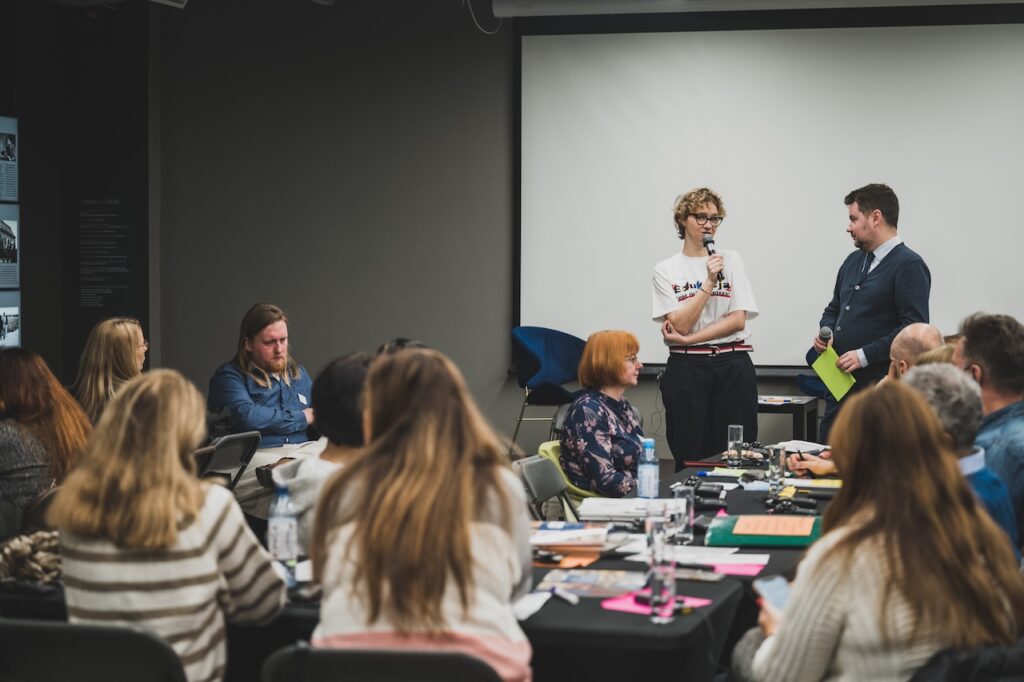
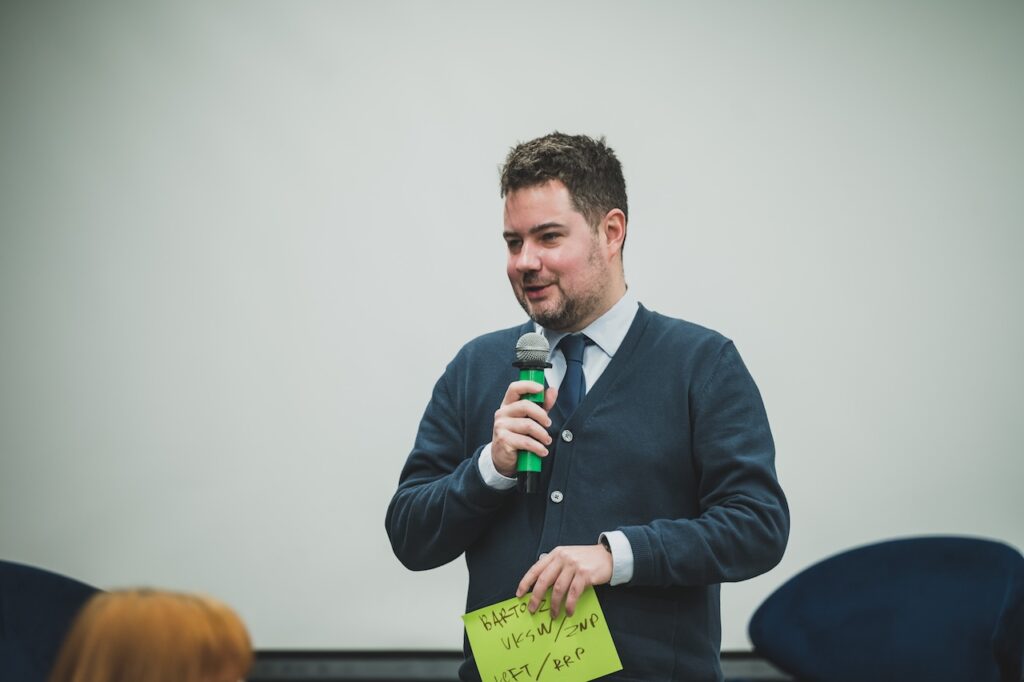
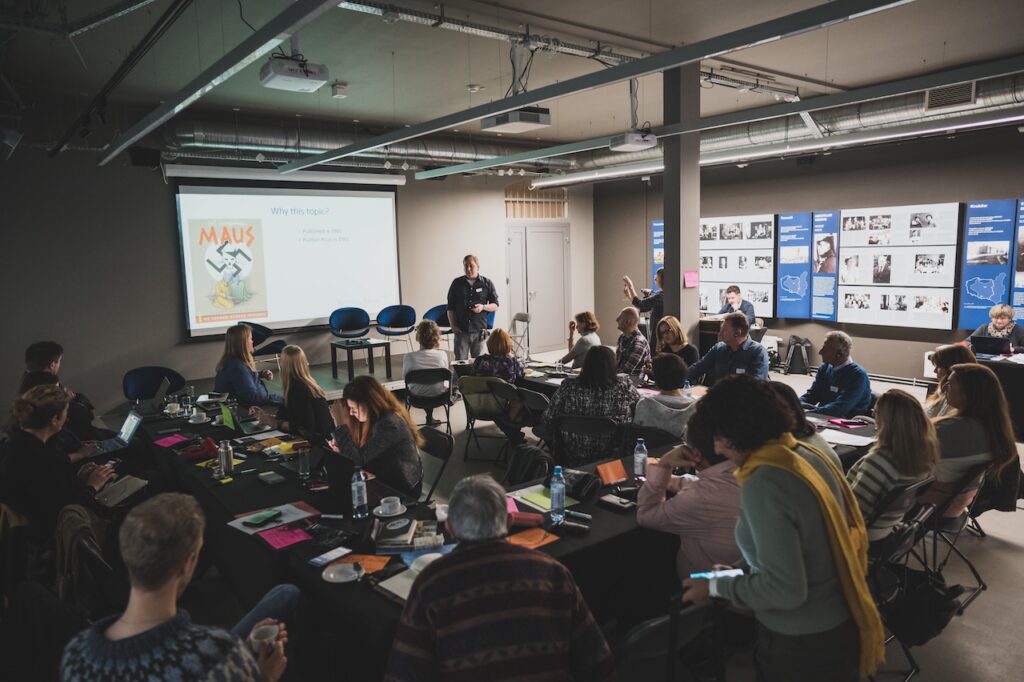
After his half-hour lecture entitled „The Emotional Legacy of National Socialism: Intergenerational Transmission on the Side of the Perpetrators, Three Generations of Women,” I asked five participants in the meeting to take their places on the podium: three teachers from Israel and one teacher each from Germany and Poland. The lack of space on the stage for two additional seats limited the possibility of full use of the Fishbowl method; however, those in the room and other participants in the training invited me to participate in the discussion between the statements of the „panelists.” I’ve chosen the fishbowl method as it is a participatory discussion technique. Our particular group setting was made to facilitate dialogue, encourage active listening, and ensure equal participation. „Inner circle” participants of the fishbowl method had a role in actively discussing the topic. They made the framework for other voices of the „outer circle” participant who have added their perspectives and thoughts.
Another method that could be applied in this part of the seminar would be the World Café method, a structured conversational process for facilitating open and collaborative dialogue, typically in small, rotating groups, to generate ideas and share knowledge. A good fit would be the 1-2-4-All method, which is a collaborative brainstorming technique where individuals first think independently (1), then discuss in pairs (2), combine ideas in groups of four (4), and finally share insights with the whole group (All). Time constraints for this part of the training, the setup of the conference room, and simultaneous translation (Polish-German-Hebrew) made me choose the Fishbowl method. The other methods would have been applicable if the trainees spoke the same language (such as English). However, this did not apply to the mixed Polish-German-Isreal group. Only some people were speaking English fluently.
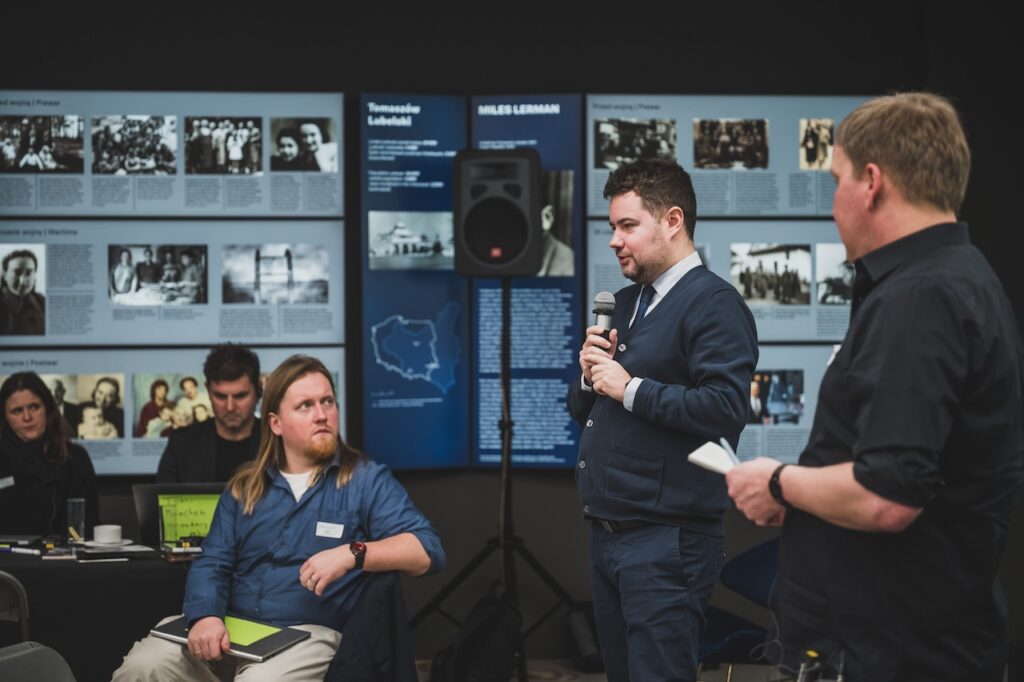


The aim of the Fishbowl task was an intercultural and international exchange of experiences in teaching about the Holocaust and sharing best practices in working with young people on this tragic subject for humanity.
The „panel” part included Israeli teachers who taught at three levels (pre-school, elementary, and secondary), while, Polish and German teachers had experience working with young people in high school and middle school. Among the other participants were teachers from all countries teaching at each level, two former teachers (from Poland and Israel), and a ZNP employee who is not currently a teacher.

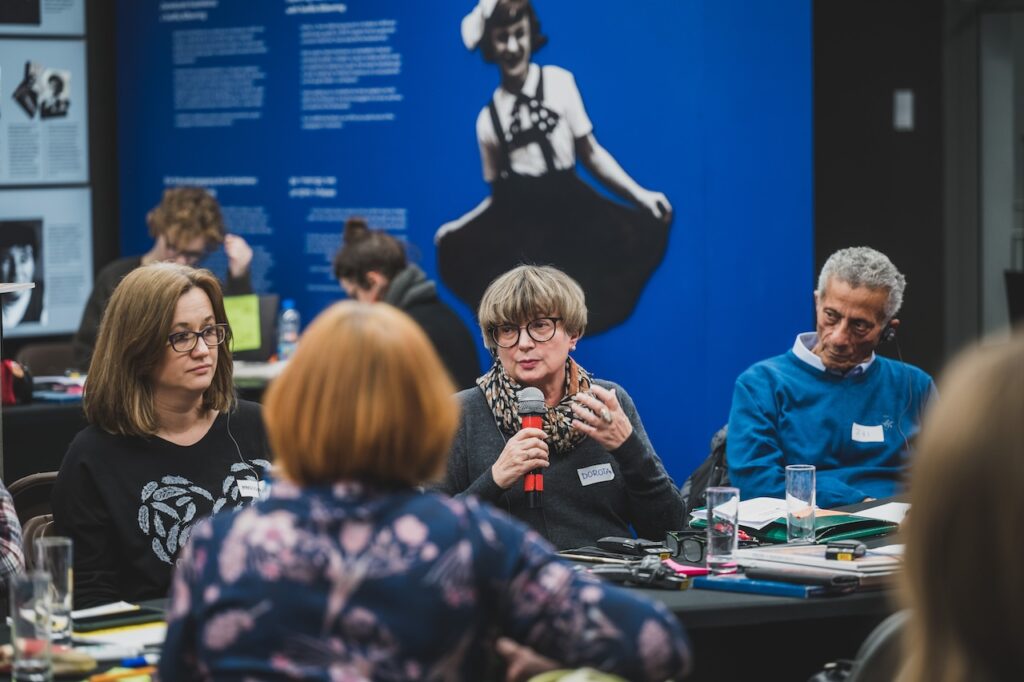
„Panelists” had 4 minutes to make an introductory statement, while those in the room were asked to speak in essence for up to 2 minutes. 1.5 hours for the exercise was sufficient time for this training activity. In the end, as the presenter, I summarized the leading voices. I asked for the continuation of the conversations in informal groups both during the joint lunch and dinner, as well as on the way to the ceremony commemorating Auschwitz-Birkenau camp liberation, which took place during the next day of the seminar.
Post-training reflection
Conducting classes, seminars, and trainings on the Holocaust is one of the most significant challenges for me as an educator, for it deals with the understandable emotions associated with the cruelest crime of genocide in recent history. World War II had a tremendous impact on my family as well. The Gestapo murdered my great-grandfather; my grandfather was a prisoner in a German labor camp close to Hamburg, and my other grandfather was forced to migrate to the new, socialist Poland because the country’s borders were changed. Some of my family were murdered in death camps during the Warsaw Uprising or were forced to leave Poland. In other words, as a Polish teacher, academician, and trade unionist, conducting training on topics related to German Nazi or Soviet crimes involves objective emotional challenges. It also consists of a desire to act, a commitment to nurture the memory of those people who were murdered by the German Nazi regime and whose incineration in the crematorium chambers was to erase their history forever.
Baggage of emotions also accompanies the training participants each time. I have witnessed this during other trainings co-organized by ZNP and FES in Warsaw, Lublin, and Tarnow. Such was the case during the seminar in Cracow. One of the primary and recurring problems in Polish-German-Israeli training is both the symmetry and asymmetry of the parties and those taking part in the training. The Germans are seen as perpetrators and oppressors during World War II. Jews and Poles see themselves as victims of Nazi totalitarianism and terror. The crime of the Holocaust is a formative moment for the creation of the State of Israel. It indirectly influenced the way post-war West Germany functioned. At the same time, the shaping of the borders and the nature of the political regime of the Polish People’s Republic after World War II depended more on geopolitical affiliation with the Soviet camp than on the scale of the crimes that took place on the territory of occupied Poland.
The emotions of the participants and the understandable differences in attitudes toward the Holocaust also influenced the training I conducted. In the Israeli educational system, teaching about the Holocaust begins at an early age, from the kindergarten level. In Poland and Germany, World War II, including the Holocaust, begins to be taught in the teens. Therefore, during the training I conducted, those participating in the activity could not always discuss the same teaching methods. This is because it is challenging to adapt the same forms of teaching for six-year-olds and high school pupils. Therefore, I asked the training participants from Poland and Germany whether the methods used in Israeli kindergartens could be applied in Polish and German schools at the early school stage.
Many understandable emotions that accompany the training had to find an outlet in the accompanying activities of the group work itself. Therefore, after the workshop part of the program, some activities were a kind of discontinuation of conversations about the history and legacy of the Holocaust. These included, for example, tours of the former Jewish quarter in Cracow. They were devoted to former Jewish life in pre-war Poland; the tour leader spoke about symbolic places of education and socio-economic and religious life. In this way, through physical activity – such as walking – and getting out of the room, participants could ventilate their emotions in a sense. In addition, during lunch breaks, we did not insist on creating a mixing of groups in terms of nationality. In this way, the trainees were able to talk freely in their native language, which made it possible to continue talking about the complex topic of the Holocaust in their native language.
A problem during the training that also came up later in the seminar was the difference in defining the Holocaust. Teachers from Israel perceive this crime exclusively against Jews, while Poles and Germans, without belittling the Jewish victims, also point to non-Jewish victims of this crime: Poles, other Slavs, Roma and Sinti, communists, trade unionists, homosexuals, people with disabilities, who were also mass murdered by the Nazi regime. Because of this difference during the discussion, I had to intervene several times, asking that the discussion be moved to another part of the event. After returning from the ceremony commemorating the Auschwitz-Birkenau camp liberation, we tried to talk about these differences in interpretation. However, the training parties did not agree.
An additional difficulty emerged during the discussion between the „panelists” and the other training participants. During a brief discussion on the differences in understanding and defining the Holocaust, a ZNP employee who is a refugee from Ukraine spoke up. Because our training took place when the full-scale aggression of the Russian Federation had already been going on for more than 11 months, our Ukrainian colleague took the floor, pointing out that humanity is not learning from the tragic history of the Holocaust, as the genocide in Ukraine is also currently underway. She pointed to evidence of Russian crimes in Irpin, Bucha, and Hostomel. The Israeli teachers protested, saying that the comparison was inappropriate, as the scale of the two crimes was different. The Ukrainian colleague, on the other hand, was supported by one person from the ZNP, who said that every crime is a crime, regardless of scale, citing the example of the slaughter of Warsaw’s Wola district during the suppression of the Warsaw Uprising in 1944, which some historians believe was a record day for murders committed against defenseless civilians. As the trainer, I asked to de-escalate emotions and pointed out that as teachers and union members, we should be empathetic and show a willingness to understand the other side. I pointed out that the purpose of our training is not to belittle any victims but to try to exchange teaching methods that will help honor all victims of the Holocaust with dignity. I also said that in the future, as a community of teachers’ unions, we should also conduct training on methods of teaching about other crimes against humanity.
Polish-German-Israeli teacher training on the Holocaust is not easy, but it is a value in itself. The process of reconciliation between nations requires continuous work but also making available learning opportunities. It is not sure that there will ever be a consensus on definitional approaches and attitudes to teaching about this darkest time in human history. However, additional work can be done to train participants in the future. Polish and German participants can be sensitized to the fact that the Holocaust is a formative event for Israelis in terms of state-building. In the case of teachers from Isreal, one can expect a better understanding of the scale of the crimes committed against the Poles and an understanding that the Germans themselves (Communists, Social Democrats, trade unionists, Christian Democrats) were also the first victims of Adolf Hitler. To this end, it would be necessary to start working with the trainees before their arrival at the training. This could be done through a discussion around a selected passage from a book or film using online meeting platforms. For this purpose, translation into each language would have to be provided, while the leaders of this type of discussion should later lead the training. This way, the group and the trainers would get to know each other beforehand. It is also advisable that the recruitment process in each trade union should be the same so that those familiar with the history of the countries and societies participating in the trialogue participate in the seminar. It would also be helpful to prepare short YouTube materials in three languages that were able to explain the differences in attitudes to the Holocaust between Poland, Germany, and Israel in an essential way.
Analyzing my training and what I could do differently is worth considering. I would undoubtedly have brought about earlier meetings between ZNP, GEW, VBE, and ITU trainers to understand further the overarching goal of our training of learning best practices and strengthening empathy between Polish, Israeli, and German teachers. I am aware of the difficulties connected to an earlier meeting, such as the lack of time of the participants, the fact that they are full-time teachers, and the language barrier. A solution might be a moderated discussion board with automated translation. It would have been also worthwhile to try to have a symmetrical arrangement of participants who represented the relevant levels of teaching. It would be valuable to continue ongoing cooperation between all the unions involved in the project at other joint events. Also, if, in the future, all trainees spoke one common foreign language (e.g., English), other training methods (World Café, 1-2-4-All) could be used to provide an even better opportunity for cross-cultural interaction and a chance to share their personal perspectives and experiences more freely.
With such deeply emotional topics, it is immensely difficult for a trainer to distance himself or herself from the emotions that arise in the training room. One can always try to keep calm by openly referring to trade union values of respect in complex, controversial situations. I do not see, as a trade union trainer, anything terrible in reacting emotionally in situations when participants cry while telling their personal family stories relating to the Holocaust and forgiveness, as was the case during this seminar. Emotions are what makes us human.